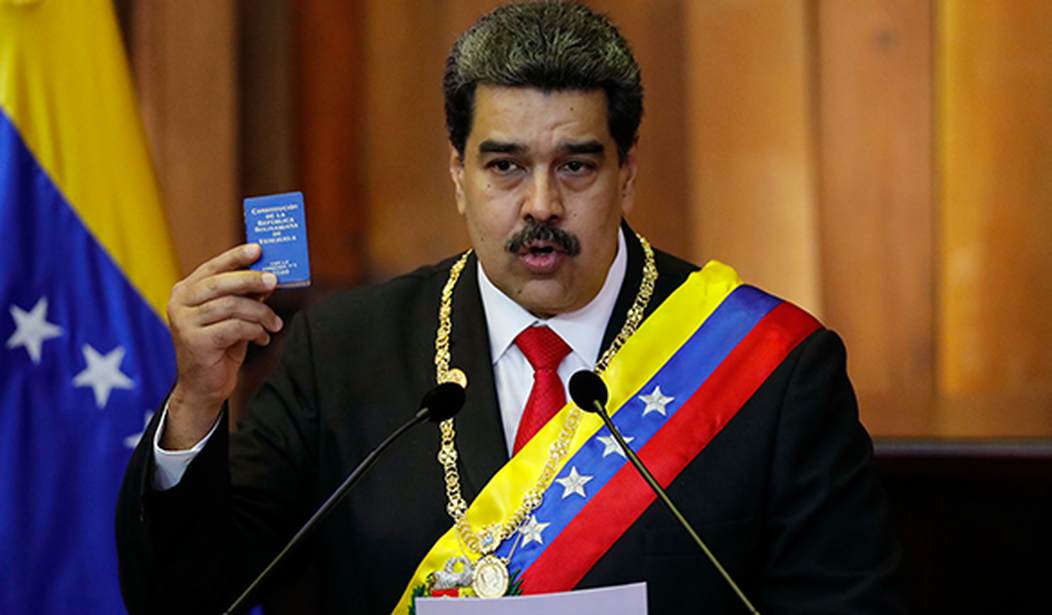Since late fall 2018, nationwide opposition to Venezuelan dictator Nicolas Maduro has shown signs of increasing coordination -- emerging links connecting angry anti-Maduro street demonstrations, domestic political preparations by opposition leaders and anti-regime international diplomatic initiatives that portray Maduro as the vicious thug he is.
Street demonstrations against the vicious socialist regime are not new. In the past, they have flared and then faded. The regime has isolated and silenced bothersome opposition leaders.
However, Venezuelan opposition actions -- lines of operation, to use jargon -- have begun to work together. The opposition is successfully waging diplomatic, political and information warfare domestically and internationally.
The opposition, however, is vulnerable to physical attack. Maduro, like his mentor, Hugo Chavez, is a heavily armed bully who uses starvation and violence to maintain control.
There are rumors of internal Venezuelan military disenchantment. On Jan. 18, the Miami Herald published an article confirming disgust but added that no serving senior officer appeared to be "willing to lead an insurrection."
As this column is written, public revolts by anti-regime military and police personnel, like the one that occurred in Caracas on Jan. 21, have been scattered, small-scale incidents marked by individual desperation and impulsiveness, not coordinated military planning.
So far, Maduro's well-armed thugs have quickly suppressed these incidents.
Still, as February approaches, these opposition lines of operation -- public anger, domestic politics, diplomacy, effective narrative warfare and nascent threats of armed action -- are coalescing into something more than random jabs at the regime.
And this process is occurring In the midst of Venezuela's economic disaster and social chaos -- despite the regime's control of food, despite the regime's enormous advantage in weapons, despite its control of the country's 300 billion barrels of proven oil reserves.
Recommended
Venezuelan oil reserves are collateral that can buy powerful friends, like Cuban security personnel, or perhaps Russian and Chinese vetoes in the U.N. That's one reason many analysts have called a nationwide uprising to topple Maduro a long shot.
However, the crude is in the ground. If Maduro falls, another government will control it. The opposition has demonstrated courage and is organizing. There is a growing possibility Maduro's dictatorship may soon face a serious, coordinated rebellion.
Which leads to repeating the moment's critical word: coalescing. The organizing process is dynamic and could be disrupted or halted. For example, members of the National Assembly (Venezuela's legislature) have set conditions to peacefully remove Maduro from power. They declared Maduro's last election illegal and that therefore he has usurped power. Assembly president Juan Guaido is forming a "transitional government." This month, Guaido asked the Venezuelan military to help the legislature peacefully remove Maduro.
Maduro could halt this political line of operation by assassinating Guaido and other legislators. Apparently, arrest doesn't deter Guaido. Maduro arrested him in 2018 and "briefly detained" him on Jan. 20 of this year.
Another disruptive option: Maduro's secret police and security forces use violent, mass repression and massacre to stop street demonstrations.
But what if massive bloodshed occurs? This hypothetical is not improbable and it raises other ugly "what ifs." How many Venezuelans must die before calls for outside intervention erupt? If violence and millions of refugees spill beyond Venezuelan borders, how do neighboring states like Colombia react? Who aids the refugees, with food, money, tents and cash?
Armed intervention is the big question. Neighboring Colombia and Brazil have no desire to send soldiers. The Pentagon is adamant that it has no plans to deploy American troops in Venezuela.
At the moment, the Trump administration is applying diplomatic muscle. On Jan. 22, Vice President Mike Pence called the National Assembly Venezuela's last vestige of democracy. He said that America "supports the courageous decision by Juan Guaido" to assert the legislature's constitutional powers and remove the "usurper" Maduro. Pence added that the U.S. "will stay with the people of Venezuela until democracy is restored."
Pence's statement portrayed Guaido as a constitutionally legitimate leader. On Jan. 23, President Donald Trump confirmed it as Guaido declared himself head of state. However this question is begged: Is Washington willing to protect him?

























Join the conversation as a VIP Member